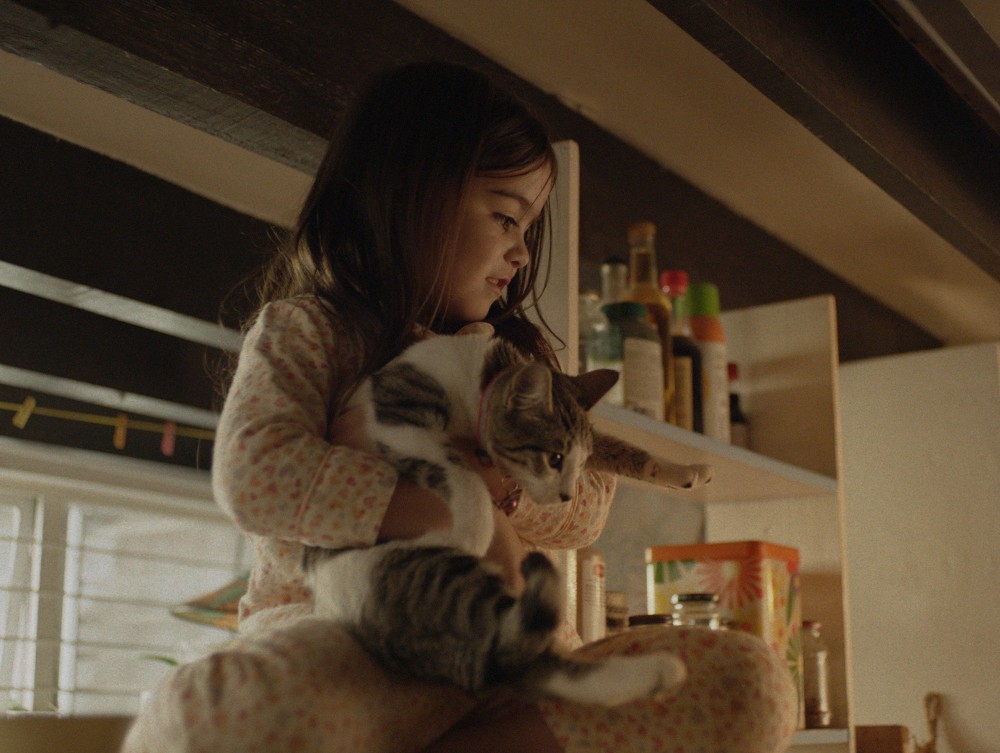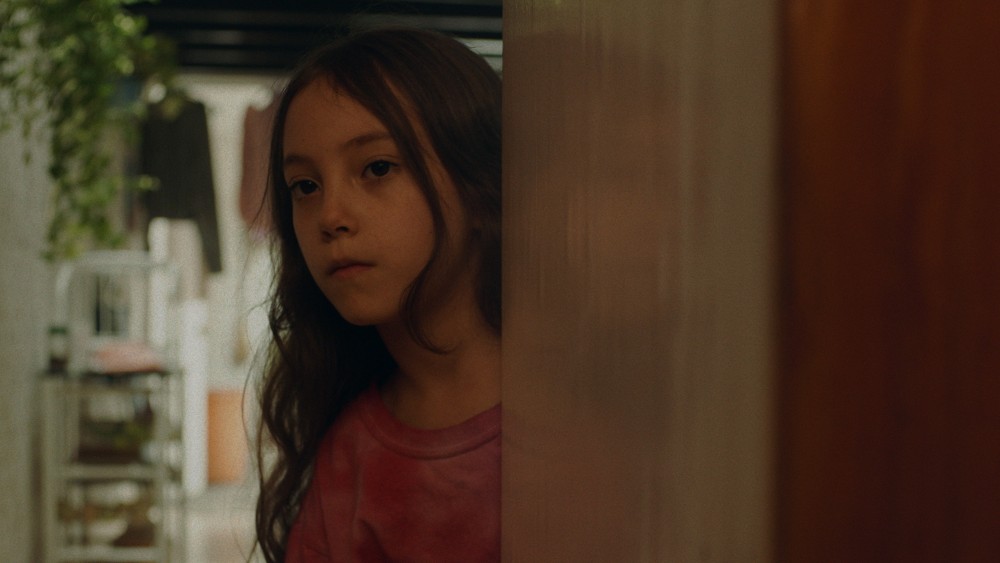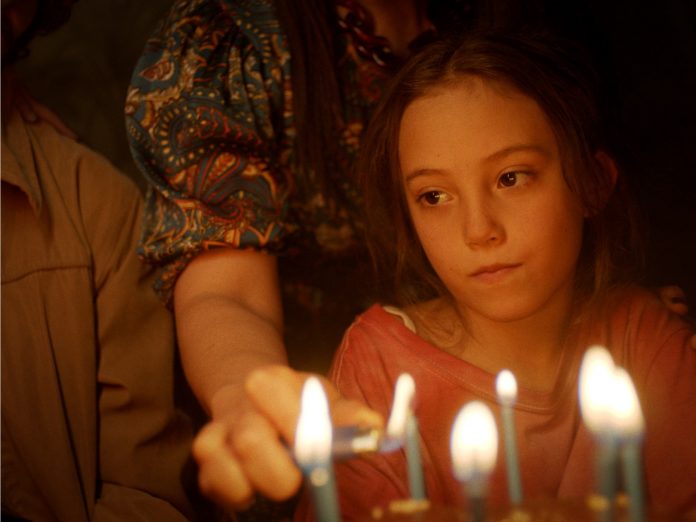For anyone who thought that the resurgence of Great Mexican Cinema was limited to the Oscar-winning “Three Amigos,” think again. One of the most exciting, fresh new faces in the Mexican and International Film Circuit is Lila Avilés. At just 35, her debut feature film The Chambermaid was selected as Mexico’s entry to the 92nd Academy Awards. In that movie, Avilés offers a quiet but profound portrayal of a woman who cleans hotel rooms in Mexico City. Her sophomore feature, Tótem, is even better, and has now been shortlisted for the Best International Feature Film Oscar, marking Avilés’ second submission in as many films.
In this film, Avilés follows seven-year-old Sol (Naima Senties) as she spends a hectic afternoon and evening in her grandmother’s house as her large family prepares a sort of birthday party for her ailing father. Sol realizes that the celebration is in some ways a mourning for her terminally-ill parent, and grows more and more disconcerted as the adults around her act in ways that are emotionally complex, and perhaps incredible, at her young age. Sol learns about life in this day, and through her own eyes the audience is treated to the beautiful, complex, and spiritual tapestry that is modern Mexican society.
Of the fifteen films still in competition, Tótem is without question one of the most connected to the country of its origin in its themes and motifs across the board. And it is a wonderful, unique testament to the magic of modern Mexican Cinema, one that begun with and has now continued after the Oscar-winning directors that put Mexico back on the cinematic map.
Above the Line caught up with Ms. Avilés last week, and discussed the film and her early success in Mexican cinema.
Note: The below interview was conducted in Spanish and translated by the author.

Above the Line: Congrats on the shortlist. How do you feel being selected to represent our country at the Academy Awards again?
Lila Avilés: Extremely happy. As you know, Mexico has a rich cinematic tradition. I am just so happy, particularly this year. There is just so much quality in film around the world, that I feel very thankful to have my movie be selected again.
ATL: It’s your second movie, did you think you’d be here again this fast?
Avilés: I did not imagine this. What is very nice about coming here, being just my second film, is that you realize you have some maturity to the way you see things. You have a certain level of maturity about it, and I am very grateful for that.
ATL: Tell us about the movie itself. It seems like there are a lot of themes there that are familiar to Mexican cinema connoisseurs—ghosts, death, family. What was your inspiration for this movie? Is the movie about Mexico?
Avilés: Totem has a lot of layers. It may appear like it is the story of a movie, Sol, in a chaotic day where they’re celebrating her father’s birthday—a celebrated person that does not want to celebrate. But really it is about a lot of other things.
As a filmmaker, I’m interested in micro-universes, and how from one small theme you can go to discuss many others. It definitely discusses family, loss, and for sure the history of Mexico. It discusses themes like the ties that bind us, but not just human ties, but also connections to plants, to animals, and to life itself. It is a movie that talks about communication and special days that mark our lives. It is also about a search for life itself.
ATL: What was the source of your inspiration?
Avilés: It is very personal. My family and I went through something similar even though we changed it a lot. Any person that has gone through emotional pain or a difficult process, you realize that the battle is not just the person who is suffering, but the entire family. And you realize these are fragile moments but also moments of love.
ATL: What does the name Tótem mean here? Does it have to do with structure of any kind?
Avilés: Not at all about order. It’s about disorder and union between community and animals, family, people. Everyone knows totems from Indo-American totems in Australia, in Canada, in Mexico. They revere animals, nature, and family.

ATL: Where does your interest and love for animals come from?
Avilés: I hope it is a universal need to express that we are not alone in the world, but rather we go together with the Earth and the animals in it. At the end of the day, the film talks about a family, but it is a micro-universe of what happens outside of that family. I think a lot of the world and our lives come from our home, and knowing who you are.
ATL: I thought the film was very perceptive as to describing the importance of family and community to Mexican society, and how Mexicans like to gather and celebrate in parties, get togethers, and it’s always quite messy. There were also ghosts showing up, it seemed. Are you referring to anything in particular with respect to Mexico?
Avilés: Going back to the point that it is a birthday party and when his friends give a toast at the party. We assume that life is linear, but in fact everything goes in spiral and there are things that come back. When we remember and talk about the past, we are going back. There is a tie, a union, to the past. At the end of the day we come from a past, and these celebrations honor that past, honor your history, honor that home that surrounds you. That is what our society is about, and how I see our lives.
ATL: Let’s switch gears, a bit. What were you looking for in the lead young actress?
Avilés: I was looking for someone with a particular serenity, like an adult serenity, but also a luminous outlook.

ATL: Talk to me about any cinematographic techniques, or any other directorial tricks you used to convey the message the film was about.
Avilés: I was looking for fluidity, and ease between the characters, so we did not feel like they were pushing the story or forcing it towards drama. I wanted the film to have a connection with the viewer, to have the audience feel like they were invited home, but then permitted to feel however they felt. I was purposefully not trying to manipulate a particular type of emotion, I wanted to be open and honest with the characters, to let people feel like they felt.
BTL: What were some of the challenges of making this film?
Avilés: This film may seem simple but it’s extremely complex. At very moment if we did not have each and every needed spoke in the wheel, the film crumbled entirely into something else. These were very emotional moments such that if you did not have one thing direct you to another thing, another emotional moment, it would not work.
The film is now a totem for me. I am going to love it and be thankful for it forever. With the first one you feel like a filmmaker, but with the second one you have some maturity and I am very grateful for that.
Tótem will open in New York at the Film Forum on Jan. 26 with more theaters to follow.



